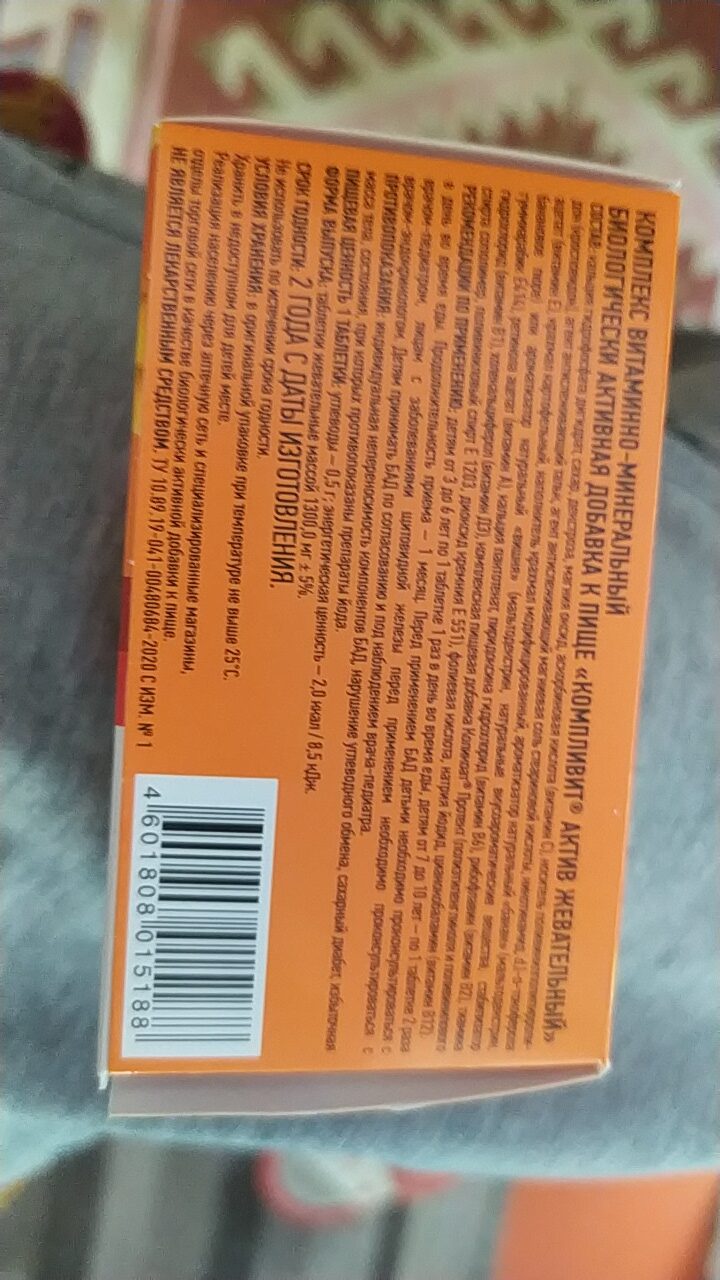
Barcode: 4601808015188
компливит® актив жевательный
HALAL
📝 Reason: Many ingredients in this product are clear and plant/mineral-based and thus Halal. However, several ingredients (stearic acid, modified starch, some vitamins, natural flavors) can be animal-derived or processed with alcohol/enzymes from non-Halal sources. In Islam, any doubt about ingredient source or process, without certified Halal labeling, renders it Doubtful (Muslim scholars refer to ‘avoid doubtful matters’ in hadith, and see Quran 5:3, IFANCA guidance).
🏷️ Category: Vitamin Supplement
📄 Certificates: Vegetarisch, Vegan
Ingredients:
Details
Understanding the Halal Status of Компливит® Актив Жевательный
Компливит® Актив Жевательный is a popular vitamin supplement known for its various health benefits. For many consumers, especially in the Islamic community, determining whether the product is Halal is essential. According to the information provided, Компливит® Актив Жевательный proudly holds a Halal status. However, let’s delve deeper to understand why.
Why is Компливит® Актив Жевательный Halal?
The product’s Halal status is attributed to the nature of its ingredients. Most of them are clear and derived from plant or mineral sources. However, some ingredients require further analysis due to their potential animal origins or processing methods.
Ingredients Breakdown
Let’s examine each ingredient and E-number to understand their origins and Halal compliance:
- Calcium hydrogen phosphate dihydrate: An inorganic mineral salt with no animal origin, deemed Halal. Source
- Sugar: Sucrose from plant origin, Halal if no processing issues are present. Source
- Dextrose: D-glucose usually sourced from corn or wheat, plant-based and Halal. Source
- Magnesium oxide: An inorganic mineral not derived from animals, Halal. Source
- Ascorbic Acid (Vitamin C): Generally synthetically produced or from plant sources, Halal. Source
- Polivinilpirrolidon: A synthetic compound, not animal-based, compliant with Halal standards. Source
- Agent Anti-Caking Talc: A naturally occurring mineral that is Halal. Source
- Anti-Caking Agent Magnesium Salt of Stearic Acid: This can be animal- or plant-derived; the source is unspecified, rendering it questionable. Source
- Nicotinamide: A synthetic Vitamin B3, not derived from animals, Halal. Source
- DL-Alpha-Tocopherol Acetate (Vitamin E): Often derived from plant oils or synthesized, thus Halal. Source
- Potato Starch: Plant-derived and Halal. Source
- Modified Starch: This ingredient’s modification process may include enzymes or chemicals, leading to a Halal status that is uncertain. Source
- Natural Flavoring (Banana or Cherry): Inclusion of natural flavoring substances may imply possible animal or alcohol origins. Maltodextrin is usually plant-derived. Source
- Retinol Acetate (Vitamin A): Can stem from fish oil or animal sources, so its Halal status is determinate based on sourcing. Source
- Calcium Pantothenate: Synthetic and Halal. Source
- Pyridoxine Hydrochloride (Vitamin B6): A synthetic form; Halal. Source
- Riboflavin (Vitamin B2): Can be derived from various sources; its Halal status is uncertain without specific sourcing information. Source
- Thiamine Hydrochloride (Vitamin BT): Synthetic and generally Halal. Source
- Cholecalciferol (Vitamin D3): Is usually derived from lanolin or fish oil, creating potential Halal sourcing questions. Source
- Complex Food Additive Colikatt Protekt: This is a synthetic ingredient, but the manufacturing process lacks a clear Halal status. Source
- Silicon Dioxide (E551): Is firmly categorized as Halal. Source
- Folic Acid: Synthetic Vitamin B9, Halal. Source
- Sodium Iodide: An inorganic compound not derived from animals, thus Halal. Source
- Cyanocobalamin (Vitamin B12): May be synthesized, but could also be derived from animal-based carriers, thus raising questions for Halal compliance. Source
Conclusion
In conclusion, while many ingredients in Компливит® Актив Жевательный uphold Halal standards, critical scrutiny should be applied, especially concerning certain components with ambiguous sourcing. Based on Islamic dietary laws, uncertainty exists in consumption without verified Halal certification, as noted by scholars who emphasize avoiding doubtful matters. Thus, it is prudent for consumers to engage with certified products whenever possible.
